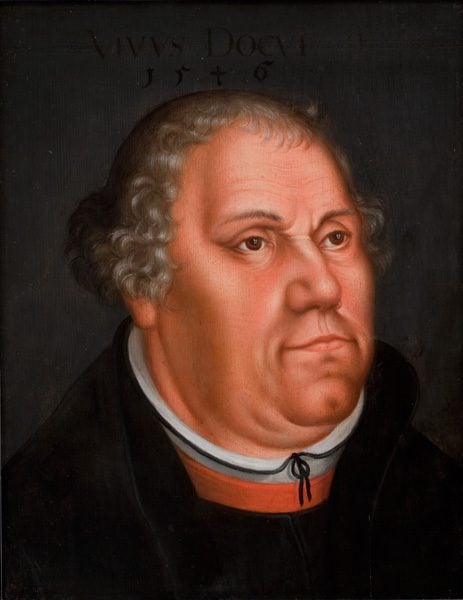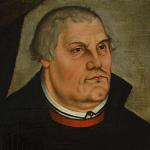
I looked through virtually every reference to deuterocanonical citations in the Index to Luther’s Works (vol. 55 — I have the entire set in hardcover) and found a few other things on my own. Luther cites as “Scripture” Ecclesiasticus (or Sirach) twelve times, referencing as many different passages. He cites Wisdom of Solomon in this way five times. He calls 1 Maccabees “Scripture” twice, and virtually equates the book of Judith with Scripture, saying that its words are to “be understood as though they were uttered in the Holy Spirit by a spiritual, holy poet or prophet” (in his 1534 Preface to this book). If I had my words described like that I’d be quite honored!
That’s a pretty significant departure from the views of later Protestants and almost all Protestants today. I find it fascinating. Perhaps you do, too.
In my 2014 book, The “Catholic” Luther : An Ecumenical Collection of His “Traditional” Utterances, I list all these references in their entirety. I only used quotations (save one instance, I think) where he used the word “Scripture” in the immediate context. Many other citations didn’t do that, but arguably were presented in a way that suggested scriptural status, since they were casually cited as authoritative, or alongside passages from books accepted by Protestants, or described with the introduction of “It is written” and other such “high-sounding” words.
In any event, I selected only the crystal-clear instances, so objectors will have no case whatsoever against them. They are what they are. Only Luther’s words appear below, in chronological order (except for the bibliographical source material):
*****
In the Psalms and in Scripture the word toil (labor v. 10) is taken in the sense of sin, because it afflicts and wearies the soul, as it is written (Wisd. Of Sol. 5:7): “We wearied ourselves in the way of iniquity, and we walk hard ways”; Ps. 17:4: . . . Ps. 107: . . . (First Lectures on the Psalms I: Psalms 1-75, c. Fall 1515, tr. Herbert J. A. Bouman; in LW, v. 10)
Hence it is correctly said that the understanding of Scripture is always profitable and has no end, for it says, “Be filled with my fruits” (Ecclus. 24:19). (First Lectures on the Psalms II: Psalms 76-126, c. Oct. 1516, tr. Herbert J. A. Bouman; in LW, v. 11)
Scripture attributes death to the devil. Wisd. of Sol. 2:24 says: “By the envy of the devil death came into the world.” And in Wisd. of Sol. 1:13-14 we read: “For God did not make death, neither has He pleasure in the destruction of the living. For He created all things that they might exist.” It is as if he were saying: “Death is not listed among the works of God at the beginning of Genesis.” Likewise in Ezek. 18:32: . . . (Lectures on Titus, Philemon, and Hebrews; tr. Jaroslav Pelikan [first two] and Walter A. Hansen; this citation from the Hebrews portion, April 1517 to March 1518; in LW, v. 29)
Now the Holy Scriptures administer comfort after a twofold fashion, by presenting to our view blessings and evils, most wholesomely intermingled; as the wise Preacher saith, “In the day of evil be mindful of the good, and in the day of good be mindful of the evil.” [Ecclus. 11:26] (The Fourteen of Consolation, 1520; Preface; tr. A. T. W. Steinhaeuser; in W1) [LW indicates 11:25 as the reference]
With this one thing the Scriptures, which hold all others in contempt, associate fear, saying, “Remember thy end, and thou shalt never do amiss.” [Ecclus. 7:40] (Ibid., Pt. I; ch. 2) [LW indicates 7:36 as the reference ]
So Scripture says, . . . “I have given him a bitter struggle in order that he may overcome” [Wisd. of Sol. 10:12]. (Concerning the Ministry, Sep. 1523, tr. Conrad Bergendoff; in LW, v. 40)
[A]ll heresies and errors in connection with the Scriptures have arisen, not from the simplicity of the words, . . . but from neglect of the simplicity of the words, and from tropes or inferences hatched out of men’s own heads. For example, I have never, so far as I recall, put such a forced interpretation on the words “Stretch out your hand to whatever you will” [Ecclus. 15:16] as to say, “Grace will stretch out your hand to what it wills”; nor have I said that “Get yourselves a new heart” [Ezek. 18:31] means “Grace will make you a new heart,” . . . (The Bondage of the Will, 1525, tr. Philip S. Watson and Benjamin Drewery; in LW, v. 33)
God confirms all this with many excellent examples in the Scriptures. . . . when Joseph and Azariah wanted to fight to gain honor for themselves, they were beaten [I Mac. 5:55-60]. And Amaziah, king of Judah, wanted to start a war against the king of Israel; but read II Kings 14 [:8-14] and see what happened to him. (Whether Soldiers, Too, Can Be Saved, 1526, tr. Charles M. Jacobs and Robert C. Schultz; in LW, v. 46)
Furthermore, the Scriptures admonish us to resist our flesh and our passions. Sirach 18 [:30] says, “Do not follow your base desires, but restrain your appetites.” Likewise, Romans 6 . . . (An Answer to Several Questions on Monastic Vows, 1526, tr. Robert C. Schultz; in LW, v. 46)
It is not the practice of medicine alone, however, but Scripture too that shows it to be a useful, comforting, and salutary estate, as well as a service acceptable to God, made and founded by him. In Ecclesiasticus 38 [:1-8] almost an entire chapter is devoted to praise of the physicians, . . . (A Sermon on Keeping Children in School, 1530, tr. Charles M. Jacobs and Robert C. Schultz; in LW, v. 46)
But how popishly he quotes the passage from Wisdom [7:9]: “In comparison with her, all gold is as a little sand,” and the passage from Ecclesiasticus 26 [:20 Vg]: “There is no weighing the value of a continent soul.” To them, Scripture in every passage means anything, according to whatever they want. (Prefaces I, ed. Christopher Boyd Brown, Commentary on Hermann Rab, “Specimen of Papist Theology and Doctrine,” 1531, tr. Benjamin T. G. Mayes; in LW, v. 59)
The Holy Scriptures also praise such good will, as in Ecclus. 25:2 f.: “In three things I was beautified, and stood up beautiful before the Lord and men, the concord of brethren, and friendship of neighbors, and a woman and her husband walking together in agreement.” (Selected Psalms III, this citation from Dec. 1531 was translated by Edward Sittler; in LW, v. 14)
Thus Scripture reports of the patriarch Jacob (Wisd. of Sol. 10:12): . . . (Commentaries on 1 Corinthians 7, 1 Corinthians 15 / Lectures on 1 Timothy; this citation from 1 Corinthians 15, April 1533, tr. Martin H. Bertram; in LW, v. 28)
[W]e will have to familiarize ourselves also with the language of Scripture. Scripture uses the term animale corpus, “a natural body,” . . . as we have it recorded also in Ecclus. 31 [:12 ff.].” (Ibid.)
[I]ts words and speech adhere to the same style as the other books of sacred Scripture. This book [1 Maccabees] would not have been unworthy of a place among them, because it is very necessary and helpful for an understanding of chapter 11 of the prophet Daniel. . . . the book is good for us Christians to read and to know. (Preface to the First Book of Maccabees, 1533, tr. E. Theodore Bachmann; in LW, v. 35)
[I]t is proper for the first book [of Maccabees] to be included among the sacred Scriptures, . . . (Preface to the Second Book of Maccabees, 1534, tr. E. Theodore Bachmann; in LW, v. 35)
[T]his [Judith] is a fine, good, holy, useful book, well worth reading by us Christians. For the words spoken by the persons in it should be understood as though they were uttered in the Holy Spirit by a spiritual, holy poet or prophet who, in presenting such persons in his play, preaches to us through them. (Preface to the Book of Judith, 1534, tr. E. Theodore Bachmann; in LW, v. 35)
Holy Scripture directs and advises us to be suspicious when it plainly states (Ps. 116:11): “All men are liars.” “A man’s enemies,” says the prophet (Micah 7:6), “are the men of his own house.” “Do not trust a friend” (Ecclus. 6:7). “Put not your trust in princes” (Ps. 146:3). . . . [cites Mic 7:5 and Mt 10:34] . . . These are clear words of Scripture. (Lectures on Genesis, Chapters 6-14, Dec. 1536, ed. Jaroslav Pelikan, tr. George V. Schick; in LW, v. 2)
[H]e who wants to read about these matters with profit should be convinced that Holy Scripture is divine wisdom, not the wisdom of men. . . . the more one draws and drinks from it, the more one thirsts for it, as Ecclesiasticus says (24:21, 20): “Those who eat me will hunger for more, and those who drink me will thirst for more. For my spirit is sweeter than honey, and my inheritance sweeter than the honeycomb”; for in that book are treated “things into which angels long to look,” as 1 Peter 1:12 states. (Lectures on Genesis, Chapters 21-25, May 1540, ed. Jaroslav Pelikan, tr. George V. Schick; in LW, v. 4)
[W]e shall say something about the doctrine and meaning of Holy Scripture concerning dreams, for it sometimes approves of dreams and at other times disapproves of them. Sirach 34:7 says: “Dreams have led many astray: and they have failed by putting their hope in them.” Solomon likewise says (Eccles. 5:7): “When dreams increase, empty words grow many: but do you fear God.” (Lectures on Genesis: Chapters 31-37, c. March 1544, tr. Paul D. Pahl; in LW, v. 6)
For this is attested in Holy Scripture, where we read: “The prayer of the humble pierces the clouds” (Ecclus. 35:17). Likewise (Dan. 9:23): “At the beginning of your supplications a Word went forth.” (Lectures on Genesis: Chapters 38-44, c. Sep. 1544, tr. Paul D. Pahl; in LW, v. 7)
SOURCES
LW Luther’s Works, American edition, edited by Jaroslav Pelikan (volumes 1-30) and Helmut T. Lehmann (volumes 31-55), St. Louis: Concordia Publishing House (volumes 1-30); Philadelphia: Fortress Press (volumes 31-55), starting in 1955.
W1 Works of Martin Luther, Volume I (Philadelphia: A. J. Holman Co.: 1915).
***
See Related Papers:













